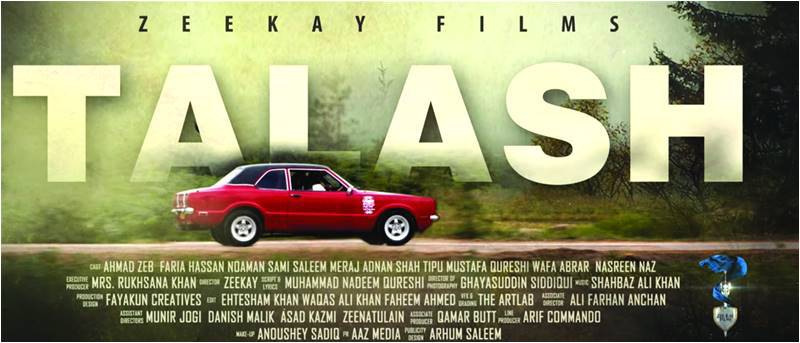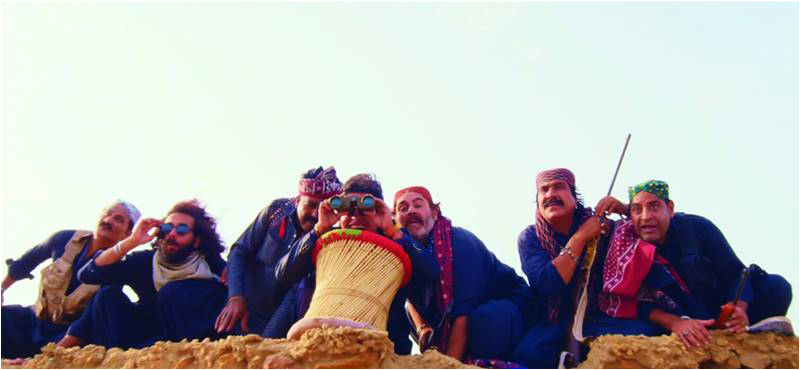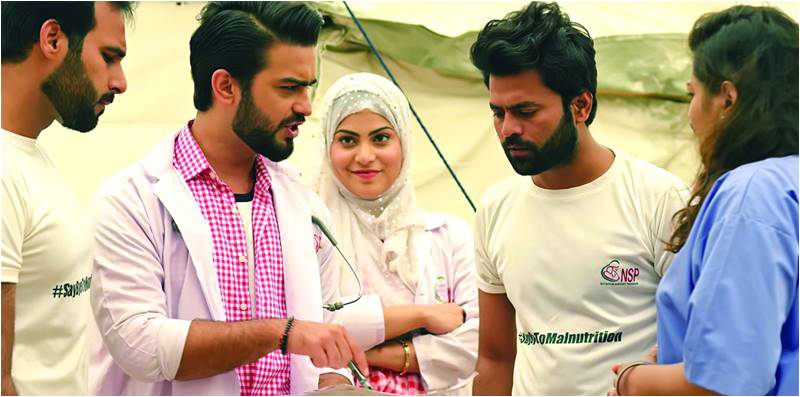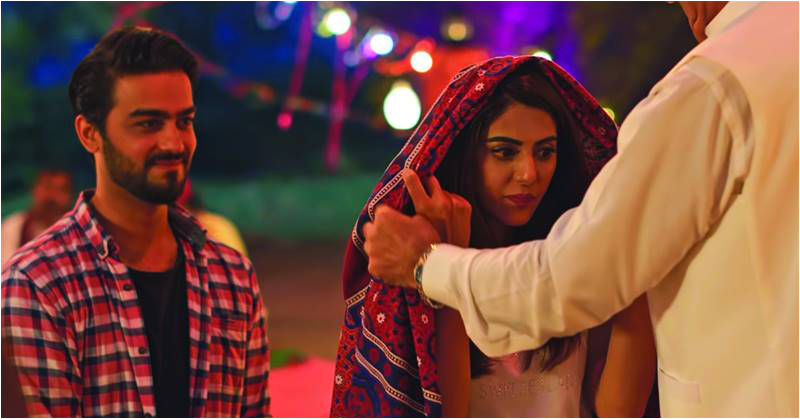
The year 2019 hasn’t exactly been a showcase of the best of the local film industry. Laal Kabootar and Durj are the obvious standouts, but most of the other releases either fall in the category of rehashes or if anything remotely original is attempted, it simply has failed to come close to the bar that professional filmmaking sets.
However, there have been two films this year which might not exactly be groundbreaking achievements in art, but have showcased sufficient promise and original content for one to be hopeful about the future of those affiliated with the productions, and in turn perhaps even Lollywood itself.
The first was Ready Steady No, which was brimming with irony and satire, with elements of dark humour. And now we have Talash, which offers a wide array of strengths as well.

This actually might have surprised a few, given that Talash’s trailer wasn’t quite as encouraging, and even suggested that the film might have the usual rehashed elements. One feared the worst again, and thought that yet another self-implosion was waiting to take place on the big screen.
Steered by Zeeshan Khan’s direction and fronted by a youthful cast, Talash relies on its storyline and its foray into uncharted territory to leave its impression. What is also on point in the film – and the fact that we need to mention here just shows the lows that Lollywood has hit in sometimes even putting together films with the most basic of skillsets – is the camerawork.

A young team of doctors featuring Khurram (Noaman Sami), Tania (Fariya Hassan), and Saleem (Ahmad Zeb) visits an interior Sindh village in Tharparkar to provide medical assistance. There, one by one, they come across issues that underline the plight of the region.
The most prominent among these is malnutrition. And for a Pakistani film to make that subject its core theme alone is worth significant praise. Other subjects include child marriage, as Talash vies to take on a multitude of social taboos. And the entire screenplay is bound together by a love story, which is more a commercial necessity than any significant contributor to the narrative.
Director Zeeshan Khan has managed all the elements well, doing what was needed to make the project viable, but at the same time ensuring that the film is true to its undertaking. He deserves special plaudits for the way he deals with the social issues that the film takes up, building a progressive narrative that is wrapped inside the more mainstream ingredients.

Humour is the most prominent of those ingredients, and actually works well throughout the film. That’s a testament to the writing, given that it manages to merge the social commentary with clean humour. However, other elements of masala being infused in the film aren’t quite as smooth, for instance the over-the-top action sequences.
The cinematography of the film is absolutely top-notch, with village life in interior Sindh masterfully captured. Again, the camerawork deserves plaudits in how the scenery is depicted while showcasing the storyline in front.
The music by Shahbaz Khan is another positive. The highlights include Hum Hain Bus by Jabar Abbas and Sanam Marvi, and Ho Jamalo by Zohaib Chandio and Naroda Malini.
It must be emphasised that Talash is, by no stretch of the imagination, flawless. If the acting by the leads, for instance, had been better, it would’ve taken the film to a new level.
Similarly, even though senior actors like Saleem Mairaj and Mustafa Qureshi showcase their dexterous selves, their screen-time isn’t sufficient enough to lift the film in that particular department. Also, the editing could’ve been much sharper, reducing the eventual runtime of two and a half hours, by a good 30 odd minutes, at least.
But of course budgetary constraints are a reality for such projects and hence one looks to focus on the promise coming out of them. Talash is a clear positive for Lollywood, one we constantly look for in our local releases, but find ever so rarely.
However, there have been two films this year which might not exactly be groundbreaking achievements in art, but have showcased sufficient promise and original content for one to be hopeful about the future of those affiliated with the productions, and in turn perhaps even Lollywood itself.
The first was Ready Steady No, which was brimming with irony and satire, with elements of dark humour. And now we have Talash, which offers a wide array of strengths as well.

Humour is the most prominent of those ingredients, and actually works well throughout the film. That’s a testament to the writing
This actually might have surprised a few, given that Talash’s trailer wasn’t quite as encouraging, and even suggested that the film might have the usual rehashed elements. One feared the worst again, and thought that yet another self-implosion was waiting to take place on the big screen.
Steered by Zeeshan Khan’s direction and fronted by a youthful cast, Talash relies on its storyline and its foray into uncharted territory to leave its impression. What is also on point in the film – and the fact that we need to mention here just shows the lows that Lollywood has hit in sometimes even putting together films with the most basic of skillsets – is the camerawork.

A young team of doctors featuring Khurram (Noaman Sami), Tania (Fariya Hassan), and Saleem (Ahmad Zeb) visits an interior Sindh village in Tharparkar to provide medical assistance. There, one by one, they come across issues that underline the plight of the region.
The most prominent among these is malnutrition. And for a Pakistani film to make that subject its core theme alone is worth significant praise. Other subjects include child marriage, as Talash vies to take on a multitude of social taboos. And the entire screenplay is bound together by a love story, which is more a commercial necessity than any significant contributor to the narrative.
Director Zeeshan Khan has managed all the elements well, doing what was needed to make the project viable, but at the same time ensuring that the film is true to its undertaking. He deserves special plaudits for the way he deals with the social issues that the film takes up, building a progressive narrative that is wrapped inside the more mainstream ingredients.

Humour is the most prominent of those ingredients, and actually works well throughout the film. That’s a testament to the writing, given that it manages to merge the social commentary with clean humour. However, other elements of masala being infused in the film aren’t quite as smooth, for instance the over-the-top action sequences.
The cinematography of the film is absolutely top-notch, with village life in interior Sindh masterfully captured. Again, the camerawork deserves plaudits in how the scenery is depicted while showcasing the storyline in front.
The music by Shahbaz Khan is another positive. The highlights include Hum Hain Bus by Jabar Abbas and Sanam Marvi, and Ho Jamalo by Zohaib Chandio and Naroda Malini.
It must be emphasised that Talash is, by no stretch of the imagination, flawless. If the acting by the leads, for instance, had been better, it would’ve taken the film to a new level.
Similarly, even though senior actors like Saleem Mairaj and Mustafa Qureshi showcase their dexterous selves, their screen-time isn’t sufficient enough to lift the film in that particular department. Also, the editing could’ve been much sharper, reducing the eventual runtime of two and a half hours, by a good 30 odd minutes, at least.
But of course budgetary constraints are a reality for such projects and hence one looks to focus on the promise coming out of them. Talash is a clear positive for Lollywood, one we constantly look for in our local releases, but find ever so rarely.

